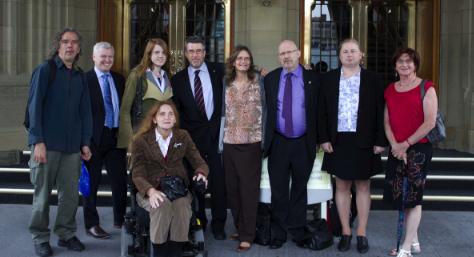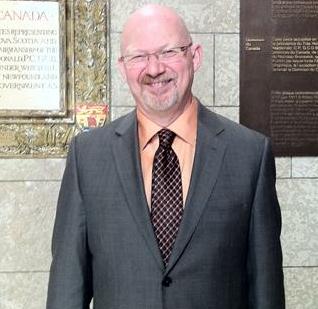
MPs Randall Garrison and Craig Scott with trans activists outside Parliament June 1, following debate of C-279. Credit: Ashley Hakker
UPDATE: June 7 — In a late vote June 6, NDP MP Randall Garrison’s Bill C-279 passed second reading by a vote of 150 to 132.
Several Conservative MPs were among those who rose to support the bill.
“I’m excited, but it’s only a first step,” Garrison says.
The bill now goes to committee before returning to the House for third reading and, ultimately, to the Senate.
Some trans activists reacted skeptically June 1 when Garrison announced his intention to support amendments removing “gender expression” from the bill and adding a definition for “gender identity.”
“If Randall Garrison [makes these amendments], then I probably would no longer support this bill,” wrote Alberta blogger Mercedes Allen. “The moment we start establishing definitions, we are placing limits and defining who can be excluded from those protections.”
Garrison maintains he’s sensitive to these concerns. “We are going to write a definition for gender identity that I hope will include the ‘expression’ phrase,” he says. “Once gender identity is in the Human Rights Code, the courts and human rights commissions will interpret what that means.”
Garrison believes the amendments are necessary to pass the bill.
Support from select Tories in the House was key to the vote.
“We worked hard to win support on the other side. I had very good cooperation from the parliamentary secretary to the minister of justice, Kerry-Lynne Findlay. She is [the Tories’] main representative on the justice committee, and I look forward to working with her on getting the bill the rest of the way through,” Garrison says.
It was a night of celebration for trans activists who made the trip to Ottawa to observe the vote. “I’m elated,” says Susan Gapka. “I’m really feeling the energy tonight. It was very empowering.”
June 5 — The House of Commons on June 1 resumed debate for second reading of C-279, “An Act to amend the Canadian Human Rights Act and the Criminal Code (gender identity and gender expression).”
Currently, murders and assaults motivated by transphobia are not considered hate crimes in Canada. Nor do trans and gender-variant people have the same explicit human rights protections against discrimination that other disadvantaged groups enjoy.
C-279 would extend the existing legislation to give trans and gender-variant people the same protection that already covers other Canadians, based on grounds such as race, religion and sexual orientation. The bill has been put forward several times before, most recently in 2011 (then called C-389), when it passed in the House of Commons only to die on the Senate order paper when an election was called.
On June 1, one Liberal member and three NDP members rose to speak in support of C-279, before its sponsor, Randall Garrison (MP, Esquimalt–Juan de Fuca), closed debate with a short statement. In the verbal vote that followed, the Speaker declared the “yeas” outweighed the “nays.”
This could have sent C-279 sailing into committee, the next step before returning to the House for third reading before going to the Senate. However, in such an unrecorded debate, parliamentary protocol allows dissenting members to rise in objection to passing the bill. Five Conservative MPs rose (the minimum required), so the question has been deferred to a recorded vote, which is scheduled to take place June 6.
Recent Toronto-Danforth by-election winner Craig Scott (NDP) likened C-279 to Ontario’s Toby’s Act, calling it the “analogue bill” to C-279. Unlike at the federal level, Toby’s Act has support from Ontario’s Progressive Conservatives (it has been co-signed by Christine Elliott, deputy party leader of Ontario’s PCs).
In an effort to draw attention to the all-party support for Toby’s Act, Scott read statements from Ontario Progressive Conservatives Christine Elliott and Jane McKenna, who both spoke passionately in favour of trans human rights.
By contrast, C-279 has met with harsh resistance from Conservatives on Parliament Hill. Some have called it a “bathroom bill” and have even gone as far as comparing trans people to sexual predators.
With the present Conservative majority in the House, bringing Tories onside is the only real hope for passing this contentious piece of legislation. Garrison says he is hopeful enough moderate Conservatives will support it, but many on the Hill feel the vote will be extremely close.
Some Conservatives have stated support in principle for the human rights of transgender people but have expressed concerns over a lack of clear definitions for the terms “gender identity” and “gender expression.” In the hope of garnering last-minute support from undecided Tories, Garrison floated an unexpected compromise in his debate-closing speech on June 1.
“I am committing today to support changes to the bill which I believe will preserve the essence of the bill while still meeting the concerns of . . . the other side of the House,” Garrison explained in Parliament. “We will . . . remove the term ‘gender expression’ from the bill, and we will support an amendment to add a definition for ‘gender identity’ to the bill.”
The pronouncement came as a surprise to trans activists, including Trans Lobby Group chair Susan Gapka, who was present in the gallery. “That is itself a form of differential treatment discrimination,” she points out, “[because] none of the other grounds in the Human Rights Act have to be defined like that.”
There is concern the definitions may limit protections available to gender-variant persons in certain circumstances, for example persons living in “alternative” or “non-binary” gender identities.
Transsexual Newfoundland blogger Jennifer McCreath took her concerns to YouTube, calling Garrison’s compromise “a bombshell” and asking, “What are the legal implications?” She echoed the concerns of other activists, pleading, “Don’t take [gender] expression out, it’s very important.”
When asked how the proposed compromise may affect gender-queer and gender-variant Canadians, Garrison says he’s aware of the needs of that group, and “their needs will be taken into consideration” when preparing the definitions.
Christin Scarlett Milloy is a member of the Trans Lobby Group.

 Why you can trust Xtra
Why you can trust Xtra


